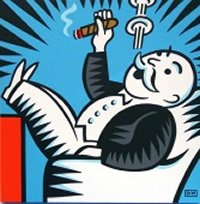 (A twist on the last line of the song, “Taxman” by The Beatles - Blogger is REALLY acting up at the moment for yours truly, by the way…)
(A twist on the last line of the song, “Taxman” by The Beatles - Blogger is REALLY acting up at the moment for yours truly, by the way…)In light of tomorrow’s income tax filing deadline, Parade Magazine tells us the following here…
A 2004 U.S. Government Accountability Office (GAO) study found that 61% of American corporations, including 39% of large companies, paid no corporate income taxes between 1996 and 2000. Last year, corporations shouldered just 14.4% of the total U.S. tax burden, compared with about 50% in 1940.And by the way, the effort to try and close the loophole allowing U.S. companies to maintain offshore “divisions” as a means of tax avoidance was led by the late, great Paul Wellstone in 2002 here; he managed to attach an amendment to a defense bill that would ban the awarding of defense contracts to U.S. companies maintaining an offshore presence, even if it is so much as even a P.O. box, to get out of paying their fair share (and when Wellstone tried to fix this, a veritable army of former-senators-and-now-lobbyists of both parties descended on Capitol Hill to defeat it, as the Times story tells us; they ultimately did of course).
While companies are getting off easy, thanks to loopholes, ordinary wage earners are getting stuck with the tab. The tax burden on individuals is expected to climb from $1.16 trillion in 2007 to $1.21 trillion this year, according to the Congressional Budget Office (CBO), while corporate tax receipts are expected to decline from $370 billion to $364 billion. By 2013, the CBO estimates, ordinary taxpayers’ bills may climb to $1.86 trillion while corporate tax bills drop to $327 billion.
…
In one recent case, KBR—a former Halliburton subsidiary and the largest Iraq war contractor—admitted to “reducing tax obligations” through two Cayman Islands divisions, reportedly avoiding hundreds of millions of dollars in Medicare and Social Security taxes. A 2004 study by the GAO found that 24 of the largest federal contractors used Cayman Islands units to shave their tax bills.
Oil and other multinational companies also benefit from tax breaks, some specially written for them. Most are perfectly legitimate, but companies sometimes push the envelope too far. Pharmaceutical giant Merck paid $2.3 billion to the government last year for profits related to a Bermuda partnership.
In their defense, businesses say that U.S. corporate tax rates are the second highest in the developed world, making our country less competitive. But a study from the nonprofit group Citizens for Tax Justice found that, because of loopholes, the corporate tax burden in the U.S. is actually the world’s third lowest when measured as a percentage of gross domestic product.
The issue of trying to close the loophole was particularly urgent when Wellstone addressed it because 9/11, which was funded in large part from offshore sources, was still fresh in all of our minds – indeed, Snarlin’ Arlen Specter…running for another term in 2010, unbelievably enough; go, Pat Toomey! And still waiting to hear about that book deal...sponsored legislation on this that probably has about as much chance of passage as I do of entering the Talladega 500.
And on top of this, the AP tells us the following here…
WASHINGTON (AP) -- The tax audit rates of the largest companies are less than half what they were 20 years ago while more small and mid-size businesses are coming under scrutiny, according to an organization that monitors the Internal Revenue Service.No word on how much of the $14.2 billion came from new assessments versus settlements of outstanding claims (upon reading the story, it sounds like smaller to mid-sized companies are taking the hit here, as opposed to those that constitute "the base" for Dubya and the Repugs).
The Syracuse University-based Transactional Records Access Clearinghouse described what it said was a "historic collapse" in audits for corporations holding assets of $250 million or more. About 26 percent of them were audited in the 2007 budget year compared with 34 percent in 2006 and 43 percent in 2005.
The IRS did not dispute the numbers, based on agency data. But it strongly disagreed with suggestions it was easing oversight of the biggest corporations.
Enforcement revenues from large companies rose by one-third in 2007 from the previous year, from $10.6 billion to $14.2 billion, said IRS Deputy Commissioner Barry Shott, who heads the Large and Mid-Size Business Division.
This will all be comforting to us as we enjoy our Mac and cheese and baloney sandwiches for dinner with a side of strained corn (yum – Wendy’s and Chick-Fil-A constitutes dining out for the Doomsy household pretty much; Friendly’s might as well be Le Bec Fin).
Just thought I’d share that…
No comments:
Post a Comment